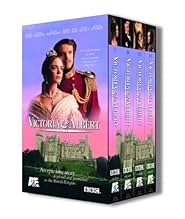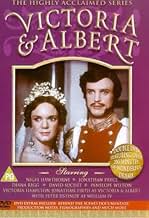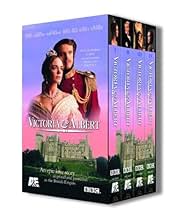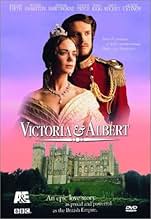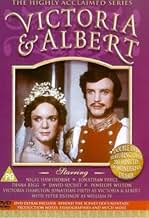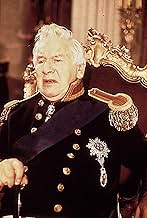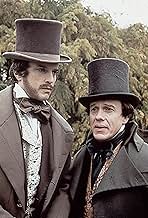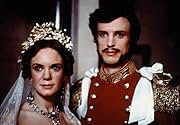Victoria & Albert
- Minissérie de televisão
- 2001
- 3 h 20 min
AVALIAÇÃO DA IMDb
7,4/10
1,1 mil
SUA AVALIAÇÃO
A apaixonada história de amor que foi o longo casamento da Rainha Vitória e do Príncipe Alberto.A apaixonada história de amor que foi o longo casamento da Rainha Vitória e do Príncipe Alberto.A apaixonada história de amor que foi o longo casamento da Rainha Vitória e do Príncipe Alberto.
- Ganhou 1 Primetime Emmy
- 1 vitória e 3 indicações no total
Explorar episódios
Avaliações em destaque
Since the days gradually came on the Royal Family in Great Britain that they are to reign rather than rule, the struggle has always been to be popular and stay popular without being self indulgent. They are the unifying symbol for their country rather than a written Constitution that we Yanks have, so they're behavior, good or bad, counts for so much more.
The folks who established that tradition were Victoria & Albert, first cousins in the Saxe-Coburg family and husband and wife. Through her father, the Duke of Kent, young Victoria was the heir to the British monarchy to which she ascended in 1837.
Royalty made its last gasp for power immediately preceding the events that are shown in this mini-series. King William IV played here by Peter Ustinov by royal prerogative dismissed the government of Prime Minster Earl Grey. Robert Peel formed a Tory government, but it only lasted for a few months because Parliament by now had firm control of the Treasury. William IV was forced to call back Earl Grey and bow to the wishes of the people's representatives, now even more representative since the Reform Act of 1832 reapportioned Parliament after several hundred years.
So the monarchy was to reign instead of rule, but if this bunch didn't keep a lid on the peccadilloes, the folks in the United Kingdom might just take it in their heads to be rid of them and get themselves a republic like their former colonies had done. That was the duty that Prince Albert (Jonathan Firth) saw it and he persuaded his young bride, Queen Victoria (Victoria Hamilton) that they must do the same.
Albert was a serious young man and Victoria had been leading a sheltered life courtesy of her mother Penelope Wilton had led a life away from the dissolute Hanoverian Court of Uncles George IV and William IV.
When you have no other purpose in life, but to set an example, you'd better be good at that. A few in the Royal Family haven't lived up to that down to this day. If you can't be good, at least be discreet.
Victoria & Albert is a good mini-series from the BBC capturing the ambiance of the early Victorian era very well indeed. Diana Rigg won an Emmy for her performance as Baroness Lehzen, young Victoria's governess who didn't quite know when to let go.
You can enjoy it even if you're not familiar with British history.
The folks who established that tradition were Victoria & Albert, first cousins in the Saxe-Coburg family and husband and wife. Through her father, the Duke of Kent, young Victoria was the heir to the British monarchy to which she ascended in 1837.
Royalty made its last gasp for power immediately preceding the events that are shown in this mini-series. King William IV played here by Peter Ustinov by royal prerogative dismissed the government of Prime Minster Earl Grey. Robert Peel formed a Tory government, but it only lasted for a few months because Parliament by now had firm control of the Treasury. William IV was forced to call back Earl Grey and bow to the wishes of the people's representatives, now even more representative since the Reform Act of 1832 reapportioned Parliament after several hundred years.
So the monarchy was to reign instead of rule, but if this bunch didn't keep a lid on the peccadilloes, the folks in the United Kingdom might just take it in their heads to be rid of them and get themselves a republic like their former colonies had done. That was the duty that Prince Albert (Jonathan Firth) saw it and he persuaded his young bride, Queen Victoria (Victoria Hamilton) that they must do the same.
Albert was a serious young man and Victoria had been leading a sheltered life courtesy of her mother Penelope Wilton had led a life away from the dissolute Hanoverian Court of Uncles George IV and William IV.
When you have no other purpose in life, but to set an example, you'd better be good at that. A few in the Royal Family haven't lived up to that down to this day. If you can't be good, at least be discreet.
Victoria & Albert is a good mini-series from the BBC capturing the ambiance of the early Victorian era very well indeed. Diana Rigg won an Emmy for her performance as Baroness Lehzen, young Victoria's governess who didn't quite know when to let go.
You can enjoy it even if you're not familiar with British history.
All pictures of Victoria have her as a stern, humorless woman.
This program did manage to shed some light on the real person and quite a bit I did not know.
I was not aware she was the niece of the previous king, thereby not directly in the bloodline, but simply next in line.
I think I had heard she was eighteen when she became queen, but I had forgotten.
And I wasn't aware of the problems with her mother and the uncle on her mother's side.
Sensational when she became her majesty, the Queen of England in their presence and they said no more.
Moments of what it means to be queen and what it means to be married were especially strong here;
when she had to respond to Albert as his wife and not as his queen.
And especially Albert's surprise when the Queen and not his wife honored him for that architectural structure.
I especially enjoyed dear Richard Briers, who never disappoints, as the architect.
When Albert informed him that the Queen had entered, Briers looks up and merely replies 'evening, mum' then continues to beam at his designs.
Her Majesty simply smiled and went to stand with her husband.
Performances were flawless all the way around. I do think Diana Rigg was wasted as the nanny. I've never enjoyed her as an unhappy person, but always in control.
I caught it on A & E, and didn't keep it. Now I wish I had. Ah well.
This program did manage to shed some light on the real person and quite a bit I did not know.
I was not aware she was the niece of the previous king, thereby not directly in the bloodline, but simply next in line.
I think I had heard she was eighteen when she became queen, but I had forgotten.
And I wasn't aware of the problems with her mother and the uncle on her mother's side.
Sensational when she became her majesty, the Queen of England in their presence and they said no more.
Moments of what it means to be queen and what it means to be married were especially strong here;
when she had to respond to Albert as his wife and not as his queen.
And especially Albert's surprise when the Queen and not his wife honored him for that architectural structure.
I especially enjoyed dear Richard Briers, who never disappoints, as the architect.
When Albert informed him that the Queen had entered, Briers looks up and merely replies 'evening, mum' then continues to beam at his designs.
Her Majesty simply smiled and went to stand with her husband.
Performances were flawless all the way around. I do think Diana Rigg was wasted as the nanny. I've never enjoyed her as an unhappy person, but always in control.
I caught it on A & E, and didn't keep it. Now I wish I had. Ah well.
10gisele22
I am a HUGE fan of A&E originals, as well as Masterpiece Theatre. Two of my favorite movies of all time are "Pride and Prejudice" (1995), and "Wives and Daughters". I am now adding "Victoria and Albert" to my list of all time favorites. This movie was absolutely stunning! And, what's even more amazing is that, unlike the previous favorites I mentioned, "Victoria and Albert" is a TRUE story! As soon as I finished watching it, I immediately went online to try to find more information on Victoria and Albert, family photos, excerpts from their diaries, etc. I had always thought of Queen Victoria as a women of 75 or so, and in a wheelchair. To see the true story of her younger years was such a treat.
The story was told SO very eloquently. Jonathan Firth and Victoria Hamilton were outstanding! They breathed life into their characters. I felt connected to Victoria and Albert somehow after I finished watching the movie. I actually felt like I was watching their lives unfold. The supporting cast was unreal. This was a dream cast, if I've ever seen one. Absolutely NO ONE was miscast. Nigel Hawthorne, as Lord M, was wonderful. The scene were he has to say goodbye to Victoria was so touching. Seeing these two historical characters sharing a tearful goodbye, and a handkerchief, was simply beautiful. The scenes between Victoria and Albert were pure magic. I love the scene between the two of them over the game of chess. I just don't know what else to say, except that this movie was utterly brilliant. It's an amazing in-depth look into 19th century British politics, but, above all, it's a stunningly glorious story of TRUE love. I'm getting teary-eyed just thinking about it! Please, please, take the time to see "Victoria and Albert". If you don't like this movie, well... then you and I could never possibly be friends. I know it's a bit harsh, but there it is. :)
The story was told SO very eloquently. Jonathan Firth and Victoria Hamilton were outstanding! They breathed life into their characters. I felt connected to Victoria and Albert somehow after I finished watching the movie. I actually felt like I was watching their lives unfold. The supporting cast was unreal. This was a dream cast, if I've ever seen one. Absolutely NO ONE was miscast. Nigel Hawthorne, as Lord M, was wonderful. The scene were he has to say goodbye to Victoria was so touching. Seeing these two historical characters sharing a tearful goodbye, and a handkerchief, was simply beautiful. The scenes between Victoria and Albert were pure magic. I love the scene between the two of them over the game of chess. I just don't know what else to say, except that this movie was utterly brilliant. It's an amazing in-depth look into 19th century British politics, but, above all, it's a stunningly glorious story of TRUE love. I'm getting teary-eyed just thinking about it! Please, please, take the time to see "Victoria and Albert". If you don't like this movie, well... then you and I could never possibly be friends. I know it's a bit harsh, but there it is. :)
When I first saw Victoria Hamilton in the trailers, I thought, 'she's not a good likeness', but having seen the first episode, I can only praise the wonderful acting and superb script. I, for one, (while reasonably coversant with history), have never thought about her early years on the throne, and the difficulty as a teenage monarch, of dealing with Mum and Parliament! Mentally, I was constantly comparing her situation with that other teenage female queen, Lady Jane Grey. Victoria as portrayed, is an engaging and thoroughly likable person, very much a child coming into adulthood, and thus a fascinating comparison to the standard historical perspective that we have grown up with.
God, the Brits are good at this sort of thing! A 180-minute history lesson presented as a story of true love. Or maybe it's the other way round. Anyway the whole thing spins along at a merry pace, especially the first half with the intrigue surrounding Victoria's ascent to the throne and her marriage to Albert. Victoria Hamilton and Jonathan Firth really convince as V & A, as does Penelope Wilton as Victoria's domineering mother. We get the usual lashings of fine supporting performances from Nigel Hawthorne (Melbourne), John Wood (Wellington), Alex McCowen (Peel), Peter Ustinov (William IV), Delena Kidd (Queen Adelaide), Diana Rigg (Baroness Lentzen) etc etc. In fact the Baroness was just about the only character in the cast that doesn't have a piece of Australia named after them. As far as I know the only one of them that actually made it out here was Victoria's younger son Prince Alfie who was shot at by some deranged person in Mosman circa 1869. The leading teaching hospital in Sydney is named after him (how's that for trivia?)
Yes, the historical record is played around with a bit my sources have Baroness Lentzen (Victoria's governess) being given her matching orders in 1842, not 1840, and Albert didn't actually save Victoria from assassination at the hands of an Irish lunatic, though his progressive views on insanity as a defence to crime may have helped to save some of the insane from the hangman (US politicians take note). However, it was probably from Albert that Victoria got her Victorian morality, and he certainly was of great influence some say he was virtually King while he was alive, at least behind the scenes. As a German he had to keep a low profile in xenophobic Britain, but he gets the credit for the success of the Great Exhibition of 1851; even if Paxton (Richard Briers) actually designed the glass and cast iron `Crystal Palace' in which it was held, Albert had the sense to see that, flimsy as it seemed, Paxton's design was an ideal solution.
It is also sometimes forgotten that Victoria and Albert started out married life when barely out of their teenage years. Both were strongly influenced by older and more experienced people yet both managed to break free. While Albert may have been the better organised and disciplined of the two, Victoria had a remarkable determination to succeed at a particularly tough job. By the end of her long reign the British monarchy had been quietly transformed.
The voluminous correspondence of both parties (the Victorians seem to have written everything down) certainly suggest that Victoria was crazy about Albert, her first cousin, almost from the start, and that Albert, not so keen on Victoria to start with despite the dynastic advantages, grew to love her deeply. This is beautifully laid out in the film, and amongst all the splendour there is a remarkable intimacy. Someone (Melbourne?) suggests at one stage that Albert, through his influence over Victoria, had saved the British monarchy `for another 100 years.' Clearly, he is needed now. Somehow one cannot imagine an equally uplifting account of the present Queen and her consort being made, either now or in another 100 years.
Yes, the historical record is played around with a bit my sources have Baroness Lentzen (Victoria's governess) being given her matching orders in 1842, not 1840, and Albert didn't actually save Victoria from assassination at the hands of an Irish lunatic, though his progressive views on insanity as a defence to crime may have helped to save some of the insane from the hangman (US politicians take note). However, it was probably from Albert that Victoria got her Victorian morality, and he certainly was of great influence some say he was virtually King while he was alive, at least behind the scenes. As a German he had to keep a low profile in xenophobic Britain, but he gets the credit for the success of the Great Exhibition of 1851; even if Paxton (Richard Briers) actually designed the glass and cast iron `Crystal Palace' in which it was held, Albert had the sense to see that, flimsy as it seemed, Paxton's design was an ideal solution.
It is also sometimes forgotten that Victoria and Albert started out married life when barely out of their teenage years. Both were strongly influenced by older and more experienced people yet both managed to break free. While Albert may have been the better organised and disciplined of the two, Victoria had a remarkable determination to succeed at a particularly tough job. By the end of her long reign the British monarchy had been quietly transformed.
The voluminous correspondence of both parties (the Victorians seem to have written everything down) certainly suggest that Victoria was crazy about Albert, her first cousin, almost from the start, and that Albert, not so keen on Victoria to start with despite the dynastic advantages, grew to love her deeply. This is beautifully laid out in the film, and amongst all the splendour there is a remarkable intimacy. Someone (Melbourne?) suggests at one stage that Albert, through his influence over Victoria, had saved the British monarchy `for another 100 years.' Clearly, he is needed now. Somehow one cannot imagine an equally uplifting account of the present Queen and her consort being made, either now or in another 100 years.
Você sabia?
- CuriosidadesNigel Hawthorne (Lord William Lamb, 2nd Viscount Melbourne) previously played Queen Victoria's grandfather King George III in As Loucuras do Rei George (1994).
- Erros de gravaçãoAt a state occasion prior to Victoria's marriage the orchestra is playing music from Strauss's operetta 'Die Fledermaus' which would not be written until many years later in 1874.
- Citações
Prince Albert: [Victoria bangs on Albert's study door] Who is it?
Victoria: [In a loud annoyed voice] What do you mean? "Who is it?" It's your queen!
Prince Albert: [Victoria takes a deep breath and calms down a bit knocks on the door calmly] Who is it?
Victoria: [In a calm and quiet voice] It's your wife.
[Albert opens the door and Victoria goes in and closes the door quietly]
- ConexõesVersion of A Rainha Vitória (1937)
- Trilhas sonorasZadok the Priest
George Frideric Handel (as Georg Friedrich Händel)
Principais escolhas
Faça login para avaliar e ver a lista de recomendações personalizadas
- How many seasons does Victoria & Albert have?Fornecido pela Alexa
Detalhes
- Data de lançamento
- Países de origem
- Idioma
- Também conhecido como
- Victoria e Albert
- Locações de filme
- Empresas de produção
- Consulte mais créditos da empresa na IMDbPro
- Tempo de duração3 horas 20 minutos
- Cor
- Mixagem de som
- Proporção
- 1.33 : 1
Contribua para esta página
Sugerir uma alteração ou adicionar conteúdo ausente

Principal brecha
By what name was Victoria & Albert (2001) officially released in India in English?
Responda


